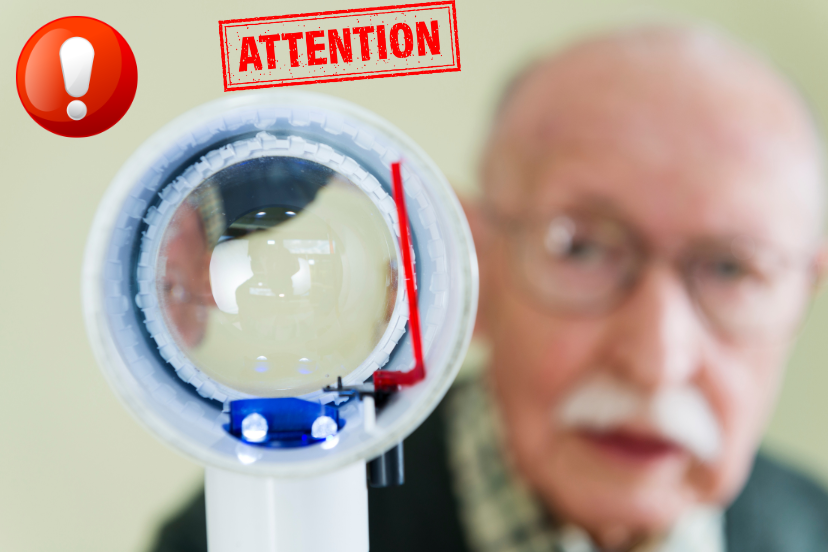What Are The Early Warning Signs Of Macular Degeneration
Macular degeneration, also known as age-related macular degeneration (AMD), is a progressive eye condition that affects the macula, the central part of the retina responsible for sharp central vision. In this “What are the early warning signs of macular degeneration” article, I want to emphasize the importance of early detection and understanding the warning signs of macular degeneration as a vision health researcher and advisor. By recognizing these signs, you can take proactive steps to preserve your vision and seek appropriate treatment if necessary.
Introduction To Macular Degeneration
Macular degeneration is a common eye disorder, especially among individuals aged 50 and above. It occurs when the macula deteriorates over time, leading to central vision loss. The macula is responsible for providing us with the ability to read, drive, recognize faces, and see fine details. Therefore, any changes or abnormalities in this crucial part of the eye can significantly impact our daily lives.
Understanding The Macula
Before delving into the warning signs, it’s important to understand the macula’s role in our vision. The macula is a small, specialized area located near the center of the retina. It enables us to see objects clearly and perform tasks that require sharp, detailed vision. Maintaining the health of the macula is essential for preserving our visual acuity.
Types Of Macular Degeneration
There are two primary types of macular degeneration: dry and wet.
Dry Macular Degeneration
Dry macular degeneration is the more common form, accounting for approximately 90% of cases. It occurs when small yellow deposits, called drusen, accumulate in the macula, causing it to thin and lose function over time.
Wet Macular Degeneration
Wet macular degeneration, although less common, is more severe and involves the growth of abnormal blood vessels beneath the macula. These blood vessels can leak fluid and blood, leading to rapid vision loss if left untreated.
Can Macular Degeneration Be Cured?
Currently, there is no known cure for macular degeneration. The condition is considered chronic and progressive. However, early detection and intervention can help slow the progression and manage the symptoms effectively. Treatment options such as intravitreal injections for wet macular degeneration and nutritional supplements for dry macular degeneration can help stabilize the condition and preserve vision to some extent. Additionally, low vision aids and rehabilitation techniques can assist individuals in maximizing their remaining vision and improving daily functioning. It is crucial to consult with an eye care professional for personalized advice and to explore the available treatment options based on the specific type and stage of macular degeneration.
Does Macular Degeneration Affect Both Eyes?
Macular degeneration can affect both eyes. It is not uncommon for the condition to start in one eye and eventually progress to the other. However, the severity and progression of macular degeneration can vary between the eyes. It is essential to monitor your vision in both eyes and seek regular eye exams to detect any changes or symptoms early on. Early detection and intervention can help in managing the condition and preserving vision to the best extent possible.
Risk Factors For Macular Degeneration
While macular degeneration can affect anyone, certain factors increase the likelihood of developing the condition. Advancing age is the most significant risk factor, with the majority of cases occurring in individuals over 50. Additionally, a family history of macular degeneration, particularly in first-degree relatives, can elevate the risk. Other risk factors include smoking, obesity, high blood pressure, and prolonged sun exposure.
Early Warning Signs Of Macular Degeneration
Blurred Or Distorted Vision
One of the initial signs of macular degeneration is a gradual or sudden decrease in the clarity of central vision. Objects may appear blurry, making activities like reading or recognizing faces challenging.
Difficulty Recognizing Faces Or Reading Fine Print
Macular degeneration can impair the ability to see details clearly. This may manifest as difficulty recognizing familiar faces or reading small print, such as the text in books, newspapers, or on electronic devices.
Increased Sensitivity To Light Or Glare
Individuals with macular degeneration may experience heightened sensitivity to bright light or glare. This can make it uncomfortable to be in well-lit environments or drive during sunny conditions.
Decreased Color Perception
The macula plays a crucial role in color vision. As macular degeneration progresses, individuals may notice a diminished ability to perceive colors accurately. Colors may appear washed out or less vibrant.
Central Vision Loss
Ultimately, macular degeneration leads to central vision loss. This means that the individual’s central field of vision becomes distorted or completely obscured, while peripheral vision remains relatively unaffected.
Importance Of Regular Eye Exams
Regular eye exams are vital for detecting macular degeneration in its early stages. Even if you haven’t noticed any symptoms, an optometrist or ophthalmologist can examine your macula and identify any potential abnormalities. Early detection allows for timely intervention and can help slow down the progression of the disease.
It is generally recommended to have a comprehensive eye exam every one to two years, especially if you are over 50 or have a family history of macular degeneration. Your eye care professional will perform a series of tests to evaluate your vision, examine the health of your eyes, and assess the condition of your macula.
Lifestyle Changes For Macular Degeneration Prevention
While certain risk factors for macular degeneration, such as age and genetics, are beyond our control, adopting a healthy lifestyle can help mitigate the risk and delay the onset of the disease. Consider the following suggestions:
Incorporate A Healthy Diet
A diet rich in antioxidants, vitamins (particularly vitamins C and E), minerals, and omega-3 fatty acids can promote macular health. Consume leafy green vegetables, fish, citrus fruits, nuts, and seeds regularly.
Maintain A Physically Active Lifestyle
Engaging in regular exercise improves overall health and may reduce the risk of macular degeneration. Aim for at least 30 minutes of moderate aerobic activity, such as brisk walking or swimming, on most days of the week.
Avoid Smoking
Smoking is strongly associated with an increased risk of macular degeneration. Quitting smoking or avoiding it altogether can have significant benefits for your eye health and overall well-being.
Limit Alcohol Consumption
Excessive alcohol consumption has been linked to an elevated risk of macular degeneration. If you choose to drink alcohol, do so in moderation, following the recommended guidelines.
Early Intervention And Treatment Options
If you experience early warning signs of macular degeneration or receive a diagnosis, there are various treatment options available to help manage the condition. The choice of treatment depends on the type and severity of macular degeneration. It is crucial to consult with an eye care professional for personalized recommendations. Some common interventions include:
Intravitreal Injections
For individuals with wet macular degeneration, intravitreal injections of anti-vascular endothelial growth factor (anti-VEGF) medications may be recommended. These injections help inhibit the growth of abnormal blood vessels and reduce fluid leakage.
Nutritional Supplements
Certain nutritional supplements, such as vitamins C and E, zinc, copper, and antioxidants like lutein and zeaxanthin, have shown promise in slowing the progression of dry macular degeneration. Consult your eye care professional before starting any supplements.
Low Vision Aids And Rehabilitation
Low vision aids, including magnifiers, telescopic lenses, and specialized lighting, can assist individuals with advanced macular degeneration in maximizing their remaining vision. Rehabilitation programs, such as vision therapy and adaptive techniques, can also help improve daily functioning.
Support And Resources For Individuals With Macular Degeneration
Receiving a diagnosis of macular degeneration can be overwhelming, but you’re not alone. There are numerous organizations and support groups dedicated to providing information, resources, and emotional support for individuals affected by macular degeneration and their families. Some notable organizations include the Macular Society, American Macular Degeneration Foundation, and Macular Degeneration Association. These organizations can provide valuable information on treatments, coping strategies, and the latest research advancements.
In addition to support groups, advancements in technology have led to the development of various assistive tools to enhance accessibility for individuals with macular degeneration. Electronic devices with built-in accessibility features, screen magnification software, and text-to-speech applications can significantly improve the ability to navigate digital content and maintain independence.
Coping With Macular Degeneration
Coping with macular degeneration goes beyond the physical aspects of the condition. It is essential to address the emotional impact that vision loss can have on individuals and their loved ones. Consider the following strategies for coping with macular degeneration:
Seek Emotional Support
Share your feelings and concerns with family, friends, or a support group. Connecting with others who are going through similar experiences can provide emotional support and practical advice.
Stay Informed
Educate yourself about macular degeneration, its treatments, and available resources. Being well-informed empowers you to make informed decisions about your eye health and engage in discussions with healthcare professionals.
Focus On Abilities
While macular degeneration can present challenges, it’s important to focus on what you can do. Adaptation and the use of assistive technology can help you continue to enjoy hobbies, pursue interests, and maintain independence.
How Can I Slow Down The Progression Of Macular Degeneration?
While there is no guaranteed way to slow down the progression of macular degeneration, certain lifestyle choices and interventions may help. Maintaining a healthy lifestyle, including a nutritious diet rich in antioxidants, vitamins, and minerals, regular exercise, and avoiding smoking, can support overall eye health. Protecting your eyes from harmful ultraviolet (UV) radiation by wearing sunglasses and hats outdoors is also beneficial. Additionally, managing underlying health conditions such as high blood pressure and maintaining a healthy weight can contribute to better eye health. It is essential to follow your eye care professional’s recommendations, including regular eye exams, and discuss potential treatment options such as nutritional supplements or other interventions specific to your condition.
When To Contact A Doctor
If you have been diagnosed with macular degeneration or are experiencing any concerning symptoms, it is essential to contact a doctor specializing in eye care, such as an ophthalmologist or optometrist. You should reach out to a healthcare professional if you notice any changes in your central vision, such as blurriness, distortion, or difficulty reading. Regular eye exams are also crucial, especially if you are over 50 or have a family history of macular degeneration. Prompt communication with a doctor allows for early detection, appropriate interventions, and management of macular degeneration to help preserve your vision.
What Are The Early Warning Signs Of Macular Degeneration – Conclusion
Recognizing the early warning signs of macular degeneration is crucial for early intervention and management of this progressive eye condition. By paying attention to changes in your vision and seeking regular eye exams, you can take proactive steps to preserve your eyesight. Remember to adopt a healthy lifestyle, seek support from organizations and support groups, and stay informed about the latest advancements in macular degeneration research and treatments. With early detection, appropriate interventions, and a positive outlook, individuals with macular degeneration can continue to lead fulfilling lives.
Please note that this article should not replace professional medical advice. Consult a healthcare professional for an accurate diagnosis and tailored treatment plan.
Frequently Asked Questions (FAQs)
Are there any dietary supplements that can help with macular degeneration?
Certain nutritional supplements, such as those containing vitamins C and E, zinc, copper, and antioxidants like lutein and zeaxanthin, have shown the potential to slow down the progression of dry macular degeneration. It’s important to consult with your eye care professional before starting any supplements.
Can macular degeneration lead to complete blindness?
Macular degeneration primarily affects central vision but does not typically cause complete blindness. However, it can significantly impact a person’s ability to perform everyday tasks that rely on a clear central vision.
What are the treatment options for advanced macular degeneration?
For advanced macular degeneration, low-vision aids and rehabilitation techniques can help maximize the remaining vision. These include magnifiers, telescopic lenses, specialized lighting, and adaptive techniques taught by vision rehabilitation specialists.
Can macular degeneration be cured?
Unfortunately, there is currently no cure for macular degeneration. However, early detection and intervention can help slow down the progression of the disease and preserve vision.
Is macular degeneration hereditary?
There is evidence to suggest that genetics play a role in macular degeneration. If you have a family history of the condition, you may be at a higher risk. However, lifestyle factors also contribute to the development of macular degeneration.
Is there anything I can do to slow down the progression of macular degeneration?
Maintaining a healthy lifestyle, including a nutritious diet, regular exercise, avoiding smoking, and protecting your eyes from harmful ultraviolet (UV) radiation, may help slow down the progression of macular degeneration.
Can a healthy diet help prevent macular degeneration?
A healthy diet rich in fruits, vegetables, and omega-3 fatty acids may help reduce the risk of macular degeneration. Consuming foods with antioxidants and nutrients beneficial to eye health can support overall eye function.




